Our approach to funding positive outcomes for nature
The world is facing simultaneous biodiversity and climate crises
Pressure is mounting from governments and the general public to rapidly roll out a global programme of well-executed nature-based solutions (NbS; e.g. preventing deforestation, afforestation, and peatland rewetting) to sequester several giga-tons of carbon each year and protect biodiversity.
However, current NbS projects are hampered by chronic underfunding, despite an increased focus on Environmental, Social, and Corporate-Governance (ESG)-oriented investment funds and expansion of net-zero commitments to 68% of the global economy. This is because current accreditation systems that measure and report the value of carbon and co-benefit services (e.g. biodiversity conservation and poverty reduction) rendered by NbS are costly, slow, and inaccurate. These failed systems have undermined trust in NbS carbon credits and restricted access to badly needed financial capital. Tragically, this prevents the injection of capital needed to shift economic incentives so that the behaviour of land-holders switches from deforestation to conservation.
World leaders at COP26 in Nov 2021 announced a promise to end deforestation by 2030, leading to an immediate and pressing need to scale up both the funding and verification of deforestation prevention efforts.
We are building a trusted, decentralised marketplace where purchasers of carbon credits can confidently and directly fund trusted nature-based projects.
The Cambridge Centre for Carbon Credits (4C) has recently received a significant charitable donation to tackle this problem systematically. The Centre has two primary goals:
1. To support students and faculty members conducting foundational research in the relevant areas of computer science, environmental science, and economics
2. To create a trusted decentralized marketplace where purchasers of carbon credits can confidently and directly fund trusted nature-based projects that ties together corporate funders to conservationists via automated and transparent global oracles. This marketplace will be compatible with existing schemes such as IPCC Article 6 of the Paris Agreement.
4C seeks to partner with the private sector, NGOs, and governments to iteratively refine these ideas.
Our goal is to exponentially increase the number of real nature-based conservation and restoration projects by channeling billions of dollars of worldwide funding towards them via market-based instruments.
All of the instruments will be bootstrapped by existing government initiatives to handle Know Your Customer (KYC) and land ownership requirements, depending on the geography involved.
Our Scientific Approach
Ultimately, there is little point in channeling funds towards nature-based solutions if there is no resultant outcome that improves the outcomes. Therefore, we are putting into place a framework that:
- combines trusted primary observations with peer-reviewed algorithms to quantitatively measure interventions
- assigns a value to each project in the form of carbon credits that are tied back to the quantitative algorithms, and lets them be traded in a global marketplace
- allows both quantitative and qualitative outcomes to be fed back to decide the future price, based on the intervention. This is vital to ensuring that projects stay on track once initial financing is raised. It is also not sufficient to apply a purely quantitative approach when judging outcomes, as some co-benefits such as biodiversity gains and local justice cannot be assessed purely remotely at present.

Our first "minimal viable product" is applying this framework to the pressing problem of stabilising forest land use, something that world leaders have promised will end by 2030.
Read on to learn more about our deforestation prevention approach:
- Our use of satellite imagery as trusted primary observations
- How our deforestation prevention algorithms work
- How our decentralised voluntary carbon market built on Tezos works
Our first prototype
Please allow social and marketing cookies to show embedded content.
